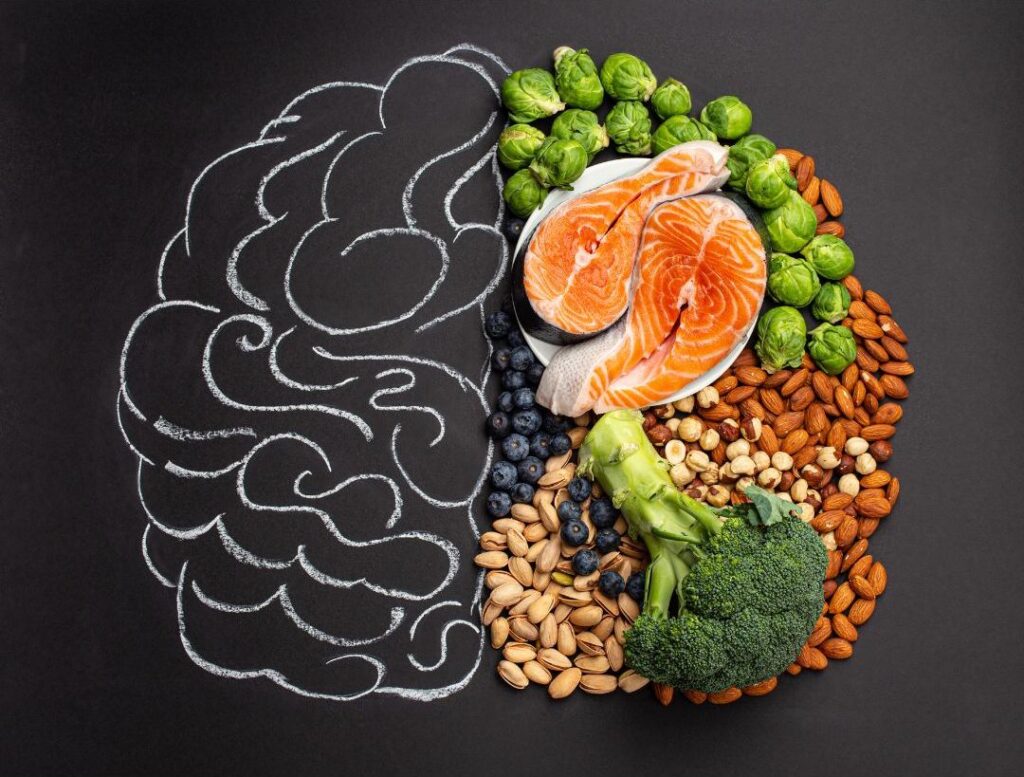Supporting Your Gut for Better Brain Health
The gut and the brain are intricately connected through what is known as the gut-brain axis. A confluence of things such as our diet, microbiome health, and gut barrier integrity all influence our mood and mental health conditions (i.e., stress, anxiety, depression).
The gut microbiome has a profound influence on our overall health, particularly our brain health. Our gut microbes influence our immune response to various triggers, production of neurotransmitters that regulate mood, and production of amino acids and anti-inflammatory metabolites. Nurturing a healthy gut microbiome is crucial for optimal brain health, and vice versa.
Fortunately, there are many ways we can heal and maintain the health of our gut! Directing our attention to elements of our life such as diet and lifestyle (i.e. environmental toxins, emotional health) all affect the microbiome.

Diet.
Our diet is one of the most important elements of our gut health. A few areas to focus on in order to improve your diet:
- Eat the rainbow. Consuming a diverse range of phytonutrient dense foods like fruits and vegetables provides essential nutrients and fiber necessary for a healthy gut.
- Prebiotic-rich foods. Include prebiotic-rich foods like asparagus, onions, garlic, leeks, sunchokes, bananas, tigernuts, cooked then cooled rice, potatoes, and oats. These foods provide nourishment for the beneficial microbes in your gut.
- Probiotic-rich foods. This includes fermented sauerkraut, kimchi, yogurt, kefir, natto, kombucha, and miso. These foods contain live beneficial bacteria that can help replenish your gut microbiome.
- Healthy fats. Foods rich in omega-3 and healthy monounsaturated fats like fish, flax seeds, walnuts, chia seeds, olive oil, and avocado can help lower inflammation throughout the body, including in the gut.
- Nutrients for brain health. Certain nutrients and supplements can support brain health, for example, amino acids (protein), vitamin D, B Vitamins, Magnesium, Omega-3s, Lithium, Nitric Oxide, and NAC/Glutathione.
Foods for brain health.
Incorporating specific foods into your diet can also promote brain health. Consider including:
- Turmeric (Curcumin): Turmeric has anti-inflammatory and antioxidant properties, making it beneficial for conditions like Alzheimer’s, Parkinson’s, and multiple sclerosis.
- Fatty Fish: Rich in omega-3 fatty acids and proteins, fatty fish like salmon can support brain health.
- Berries: Blueberries, in particular, contain anthocyanins associated with improved cognitive function.
- Extra Virgin Olive Oil: This oil positively affects gut microbes, lowers inflammation, and supports the health of the intestinal lining.
- Eggs: Eggs provide amino acids and various nutrients, including choline, which is beneficial for brain and neurological health.
- Walnuts: Walnuts are a source of DHA, omega-3 fatty acids, and phenolic compounds that support brain function.
- Avocados: These fruits are rich in healthy fats associated with better cognition.
- Beets: Beets promote the production of nitric oxide, supporting blood flow and oxygen supply to the brain.
Check out my recipe for a brain boosting smoothie recipe linked here!
Lifestyle for brain health.
Lifestyle is the glue that makes all of our healthy habits stick together. A few areas to focus on in order to improve your lifestyle:
- Movement & regular physical activity (whilst also prioritizing recovery!)
- Limiting toxin exposure (i.e., drugs, alcohol, cleaning/household/beauty products)
- Manage stress (i.e., journaling, breathwork, relationships, meditation)
- Tip: tracking heart rate variability (HRV) with wearables like oura ring or whoop is one way to measure the strength of the vagus nerve. Improved HRV is associated with resilience to stress, reduced gastrointestinal pain, improved motility, and better overall cardiometabolic health.
- Identify and remove food allergens or intolerances
- Address dysbiosis or hidden infections (by working with a functional practitioner like me!)
The gut-brain connection highlights the importance of gut health in influencing our mood, emotions, anxiety, and stress levels. By adopting a functional nutrition approach, supporting gut barrier integrity, and nurturing a healthy gut microbiome, we can optimize brain health and overall well-being. Prioritizing a nutrient-rich diet, managing stress, and considering targeted supplements can further enhance brain function. Remember, a healthy gut leads to a healthy brain, so take care of your gut to support your mental and emotional well-being.
Please reach out if you’d like to work on strengthening your gut and brain health together!
About the Authors

Paige Freyre
Paige is a health & wellness enthusiast in training with the Functional Medicine Coaching Academy.
Paige has a deep passion for the intersection between nutrition and mood – and with a background in Psychology, she loves to illuminate behaviors that simplify living a happier, more abundant life!
You can find Paige on Instagram at @happierhacks !
Morgan Goodstadt, MS, RD, CDN, LDN, IFNCP
Registered Dietitian, Master’s in Clinical Nutrition, Certified Integrative and Functional Nutritionist and Health Coach. Morgan combines her expertise in nutrition with evidenced-based functional medicine and experience in human behavior to help her clients improve their health, relationship with food, and overall wellbeing. Her philosophy aims to achieve balance in both the diet and other areas of life.

Sources:
- Rudzki L, Szulc A. “Immune Gate” of Psychopathology—The Role of Gut Derived Immune Activation in Major Psychiatric Disorders. Front Psychiatry. 2018;9:205. doi:10.3389/fpsyt.2018.00205
- Gwak MG, Chang SY. Gut-Brain Connection: Microbiome, Gut Barrier, and Environmental Sensors. Immune Netw. 2021;21(3):e20. doi:10.4110/in.2021.21.e20
- Breit S, Kupferberg A, Rogler G, Hasler G. Vagus Nerve as Modulator of the Brain–Gut Axis in Psychiatric and Inflammatory Disorders. Front Psychiatry. 2018;9:44. doi:10.3389/fpsyt.2018.00044
- Frøkjaer JB, Bergmann S, Brock C, et al. Modulation of vagal tone enhances gastroduodenal motility and reduces somatic pain sensitivity. Neurogastroenterol Motil. 2016;28(4):592-598. doi:10.1111/nmo.12760
- Jung W, Jang KI, Lee SH. Heart and Brain Interaction of Psychiatric Illness: A Review Focused on Heart Rate Variability, Cognitive Function, and Quantitative Electroencephalography. Clin Psychopharmacol Neurosci Off Sci J Korean Coll Neuropsychopharmacol. 2019;17(4):459-474. doi:10.9758/cpn.2019.17.4.459
- Lewis M, Ghassemi P, Hibbeln J. Therapeutic use of omega-3 fatty acids in severe head trauma. Am J Emerg Med. 2013;31(1):273.e5-273.e8. doi:10.1016/j.ajem.2012.05.014
- Machado-Vieira R. Lithium, Stress, and Resilience in Bipolar Disorder: Deciphering this key homeostatic synaptic plasticity regulator. J Affect Disord. 2018;233:92-99. doi:10.1016/j.jad.2017.12.026
- Joca SRL, Sartim AG, Roncalho AL, Diniz CFA, Wegener G. Nitric oxide signalling and antidepressant action revisited. Cell Tissue Res. 2019;377(1):45-58. doi:10.1007/s00441-018-02987-4
- Tardiolo G, Bramanti P, Mazzon E. Overview on the Effects of N-Acetylcysteine in Neurodegenerative Diseases. Molecules. 2018;23(12):3305. doi:10.3390/molecules23123305
- Benameur T, Giacomucci G, Panaro MA, et al. New Promising Therapeutic Avenues of Curcumin in Brain Diseases. Molecules. 2021;27(1):236. doi:10.3390/molecules27010236
- Millman JF, Okamoto S, Teruya T, et al. Extra-virgin olive oil and the gut-brain axis: influence on gut microbiota, mucosal immunity, and cardiometabolic and cognitive health. Nutr Rev. 2021;79(12):1362-1374. doi:10.1093/nutrit/nuaa148
- Cheng FW, Ford NA, Taylor MK. US Older Adults That Consume Avocado or Guacamole Have Better Cognition Than Non-consumers: National Health and Nutrition Examination Survey 2011–2014. Front Nutr. 2021;8:746453. doi:10.3389/fnut.2021.746453
Download my free guide:
Debunking Detox
The term “detox” has been exploited as a way to sell diet programs. But is there some truth to it? Do we need to “detox”? The answer, as I typically say with nutrition, is that it depends.